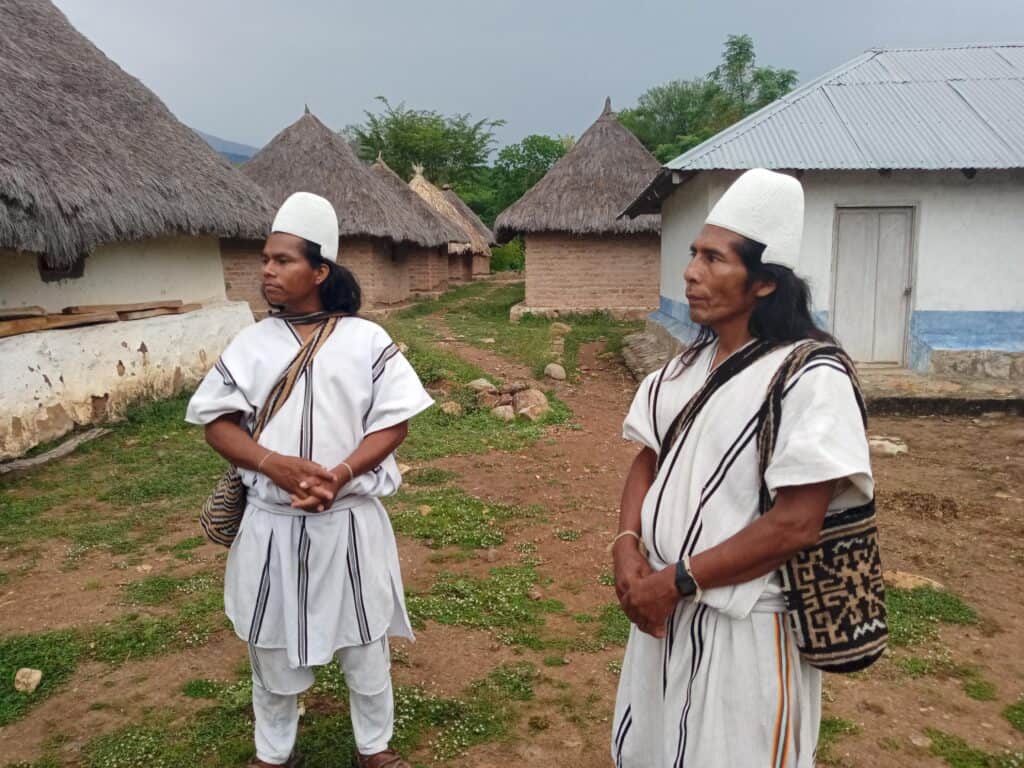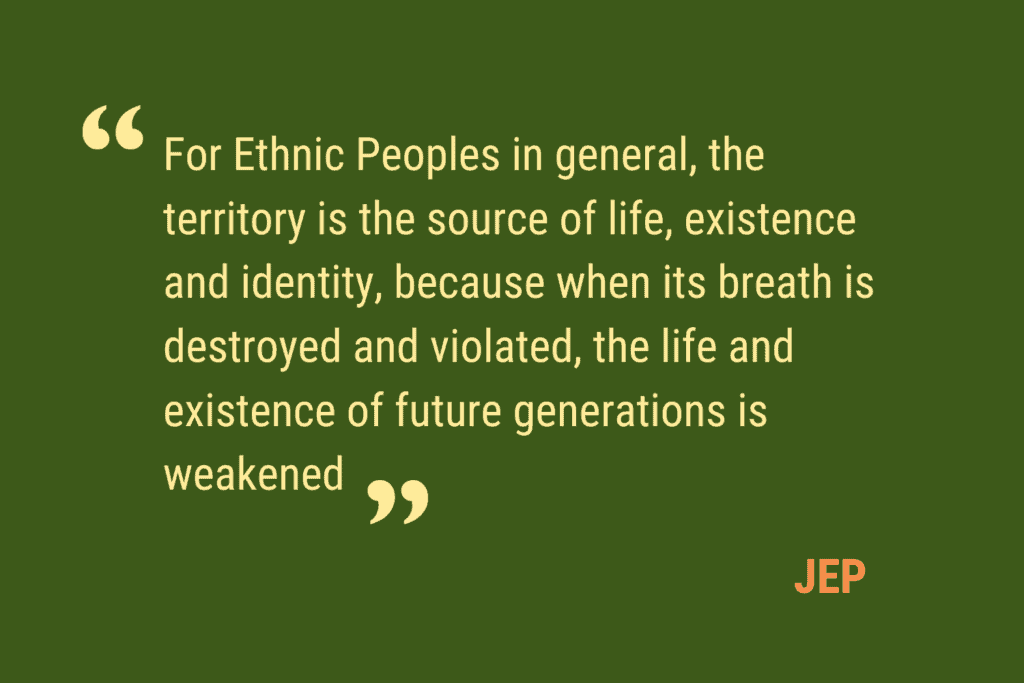
The Special Jurisdiction for Peace (JEP, Spanish acronym) will investigate crimes against humanity suffered by the Indigenous, Afro-Colombia, Raizal and Palenquera Peoples and Territories during the armed conflict by members of the FARC-EP and the Colombian Security Forces, as well as other State agents and civilian third parties.
According to JEP analysis, the victimising act with the most documented victims in case 09 is forced displacement, followed by homicide and forced disappearance. Violence produced by the internal armed conflict deeply affected Ethnic Territories and, with it, transgenerational relationships, including the ability of community members to preserve and transmit their traditional knowledge and systems of knowledge.
The JEP are currently in possession of 435 reports of which 82 were submitted by indigenous organisations, 71 by black, Afro-Colombian, Raizal and Palenquera organisations, five by state entities and 276 by human rights and civil society organisations (CSOs). The intercultural and ethnic-territorial approach that the JEP is taking in this case, is in response to the demands for truth from victims and CSOs, who highlighted that the multiple violence to which ethnic peoples and territories have been subjected, accentuated by racism and discrimination, that has put them at risk of physical, cultural and spiritual extermination, a situation recognised by the Constitutional Court over the last two decades.
Ethnic Peoples consider the territory as a living subject, a sacred entity endowed with spiritual relationships based on their own cultural processes and with a relationship of interdependence with the natural environment. Which is why the JEP will take an ethnic-territorial approach to examine:
1) crimes against humanity and human rights violations committed during the internal armed conflict;
2) the crimes from the perspective of “peoples and territories as rights holders”; and,
3) the impacts on nature, ancestral territories and sacred sites in relation to the rights of ethnic victims.
The Final Peace Accord highlighted that the ethnic peoples “have suffered historical conditions of injustice, the product of colonialism, enslavement, exclusion, and having been dispossessed of their lands, territories, and resources; who have also been seriously affected by the internal armed conflict”.
In Case 09, the JEP will incorporate differential approaches, ‘thus guaranteeing the effective participation of the victims as collective subjects and their members, who for decades were silenced and who in the framework of the Case 09 have a historic opportunity to participate, see themselves represented, heard, and to be collectively and individually restored in their rights to justice, truth, comprehensive reparation, and non-repetition of centuries of violence in their ancestral and collective territories’.
The Information Analysis Group (GRAI) of the JEP have been examining and identifying crimes committed between 1985 and 2016 against Indigenous peoples, ethnic communities and their territories, such as, homicides, sexual violence, forced displacement, disappearance force and socio-environmental damage (bombing, use of dangerous weapons, destruction of property, fumigation, installation of camps in their territory), etc.
The JEP, through the Chamber for the Recognition of Truth and Responsibility (SRVR), identified between 1996 and 2016, three criminal patterns, (one for each actor responsible for the facts) for the analysis of the case.
– FARC-EP, non amnestiable conduct against self-determination and the physical, cultural and spiritual existence of ethnic peoples and territories in the exercise of social and territorial control.
– Members of Security Forces and Agents of the State, non-amnestiable conducts aimed at the deprivation of individual, spiritual, collective fundamental rights and the territorial rights of ethnic peoples and territories, with exercise of territorial control and the counterinsurgency tactics.
– All actors within the competence of the JEP: Conducts not eligible for amnesty against the physical, cultural, spiritual and territorial integrity of ethnic peoples and territories in the framework of hostilities.
The Recognition Chamber highlights that forced displacement had one of the strongest impacts on Ethnic Peoples, being forced to leave their territory weakened their sacred connection with their collective ancestral territory, which is why this case is examining the intentional and disproportionate attack against nature, the territory and the environment in Case 09.

The Truth Commission’s report examined the attitudes that informed the violence against ethnic peoples, which were inherited from colonial discourses and practices, as well as the imaginaries of intrinsic inferiority of cultural differences, these the JEP identified as some of the causes of the criminal actions perpetrated during the armed conflict.
The JEP has made a preliminary estimate that the1.3 million victims belonging to these ethnic groups of which 14, 261 were also identified as victims of sexual violence, but the JEP warned that there may be underreporting in relation to both of these figures.
The JEP will initially focuses case 009 on the hypotheses of macrocrime patterns as follows:
Members of the FARC-EP. The direct social control of the civilian population sought to consolidate the role of the FARC-EP as a de facto political power in certain territories. Thus, due to their capacity, armed and sustained presence over time, crimes were committed against the leaders and authorities of the communities in order to impose themselves in the territories. In this regard, it is identified that the actions of the FARC-EP were aimed at: i) capturing strategic territories, seeking military, economic or political advantages; ii) govern, by imposing itself as an authority in the territories; iii) develop illegal economies with an impact on nature.
Members of the Security Forces, State agents and those in collusion with them. Territorial control using counterinsurgency strategies and the preservation of private economic interests are what resulted in many of the crimes. These crimes were motivated by prejudices and stereotypes about the supposed relationship of ethnic groups with the revolutionary ideals of the armed left, and racial discrimination. The escalation of military activity in the territories against the guerrillas, the defence of economic or political interests through alliances with paramilitary groups or third parties, resulted in crimes intensifying due to ideological or political positions associated with “the enemy within”.
All actors under the JEP’s jurisdiction are responsible for violence committed during combats and the destruction of ancestral, sacred and collective territories.
The aforementioned patterns produced multiple crimes against ethnic peoples and territories, such as: selective assassinations of traditional authorities and leaders; threats, harassment and persecution of individuals, families and communities; control limiting the mobility of people, food, medicine, fuel, etc; disrespect for the territories and their authorities; control of behaviors and cultural practices; sexual violence; occupation of property; forced displacement; forced disappearance; and territorial dispossession, amongst others.
